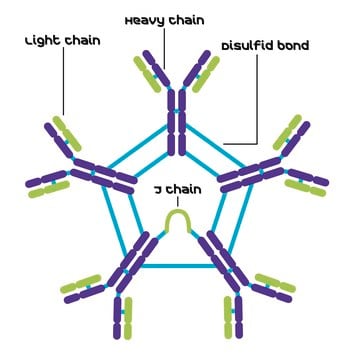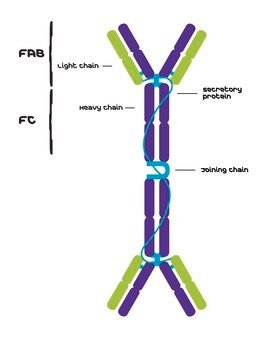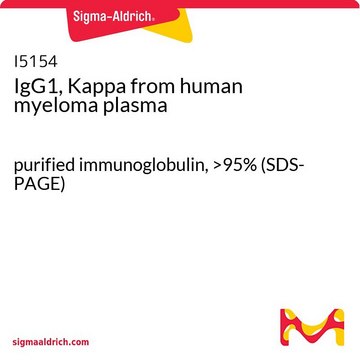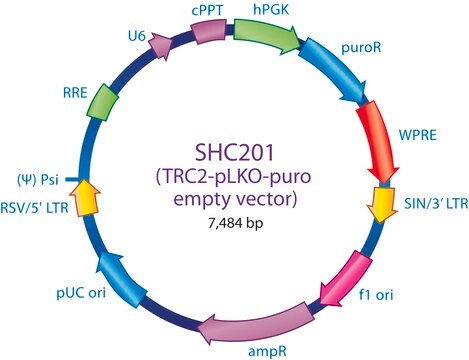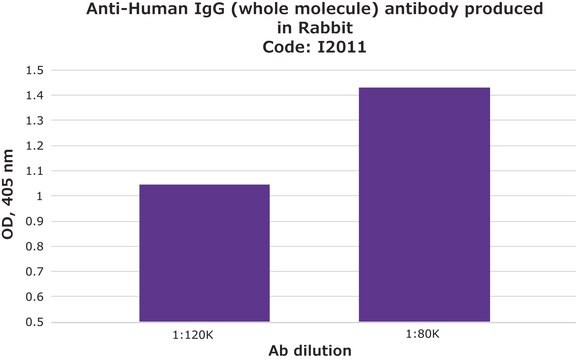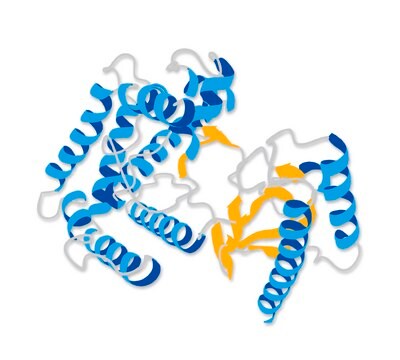I2511
IgG
reagent grade, ≥95% (HPLC), buffered aqueous solution
Sinônimo(s):
IgG humana
Faça loginpara ver os preços organizacionais e de contrato
About This Item
Produtos recomendados
conjugado
unconjugated
grau
reagent grade
Ensaio
≥95% (HPLC)
Formulário
buffered aqueous solution
Condições de expedição
dry ice
temperatura de armazenamento
−20°C
modificação pós-traducional do alvo
unmodified
Procurando produtos similares? Visita Guia de comparação de produtos
Categorias relacionadas
Descrição geral
IgG antibody subtype is the most abundant serum immunoglobulins of the immune system. It is secreted by B cells and is found in blood and extracellular fluids and provides protection from infections caused by bacteria, fungi and viruses. Maternal IgG is transferred to fetus through the placenta that is vital for immune defence of the neonate against infections
Human IgG is purified from normal human serum by precipitation and gel filtration techniques.
Human IgG is purified from normal human serum by precipitation and gel filtration techniques.
Aplicação
Purified human IgG has been used :-
- as blocking antibody for flow cytometry
- as negative control in chromatin immunoprecipitation assays
- to precipitate IgG in human larynx epidermoid carcinoma cells by immunoprecipitation
- as a standard in enzyme-linked immunosorbent assay
Ações bioquímicas/fisiológicas
Immunoglobulin G (IgG) regulates the immune responses such as phagocytosis and is also involved in the development of autoimmune diseases. IgG1 regulates complement fixation in mice.
forma física
Solution in 0.01 M phosphate buffered saline, pH 7.4, containing 15 mM sodium azide
Exoneração de responsabilidade
Unless otherwise stated in our catalog or other company documentation accompanying the product(s), our products are intended for research use only and are not to be used for any other purpose, which includes but is not limited to, unauthorized commercial uses, in vitro diagnostic uses, ex vivo or in vivo therapeutic uses or any type of consumption or application to humans or animals.
Código de classe de armazenamento
12 - Non Combustible Liquids
Classe de risco de água (WGK)
WGK 1
Ponto de fulgor (°F)
Not applicable
Ponto de fulgor (°C)
Not applicable
Escolha uma das versões mais recentes:
Já possui este produto?
Encontre a documentação dos produtos que você adquiriu recentemente na biblioteca de documentos.
Os clientes também visualizaram
In-Kyu Yoon et al.
The American journal of tropical medicine and hygiene, 72(6), 714-718 (2005-06-21)
Volunteers vaccinated with a candidate malaria vaccine containing merozoite surface protein 1(42) (MSP-1(42)) exhibit antibodies to MSP-1(42) that are measured by enzyme-linked immunosorbent assay (ELISA). The purpose of this study was to make a human reference standard for MSP-1(42) antibody
Kentaro Matsuda et al.
The Journal of allergy and clinical immunology, 116(6), 1357-1363 (2005-12-13)
Mouse monoclonal IgE antibodies can promote the survival of mouse bone marrow-derived cultured mast cells and induce the cells to secrete mediators in the absence of known specific antigen. To determine whether human IgE, in the absence of known specific
D R McArthur et al.
Colorectal disease : the official journal of the Association of Coloproctology of Great Britain and Ireland, 11(7), 775-782 (2008-08-12)
Trials investigating colorectal cancer (CRC) chemoprophylaxis with cyclooxygenase-2 (COX-2) inhibitors have been discontinued because of adverse cardiovascular effects. Nevertheless, identification of patients where beneficial, chemo-prophylactic effects of COX-2 inhibitors outweigh side-effects may be possible; this study aimed to investigate whether
Charles C Chu et al.
Blood, 112(13), 5122-5129 (2008-09-25)
Leukemic B lymphocytes of a large group of unrelated chronic lymphocytic leukemia (CLL) patients express an unmutated heavy chain immunoglobulin variable (V) region encoded by IGHV1-69, IGHD3-16, and IGHJ3 with nearly identical heavy and light chain complementarity-determining region 3 sequences.
Alberto Sinibaldi et al.
Biosensors, 8(3) (2018-07-26)
Optical biosensors based on one-dimensional photonic crystals sustaining Bloch surface waves are proposed to study antibody interactions and perform affinity studies. The presented approach utilizes two types of different antibodies anchored at the sensitive area of a photonic crystal-based biosensor.
Nossa equipe de cientistas tem experiência em todas as áreas de pesquisa, incluindo Life Sciences, ciência de materiais, síntese química, cromatografia, química analítica e muitas outras.
Entre em contato com a assistência técnica

